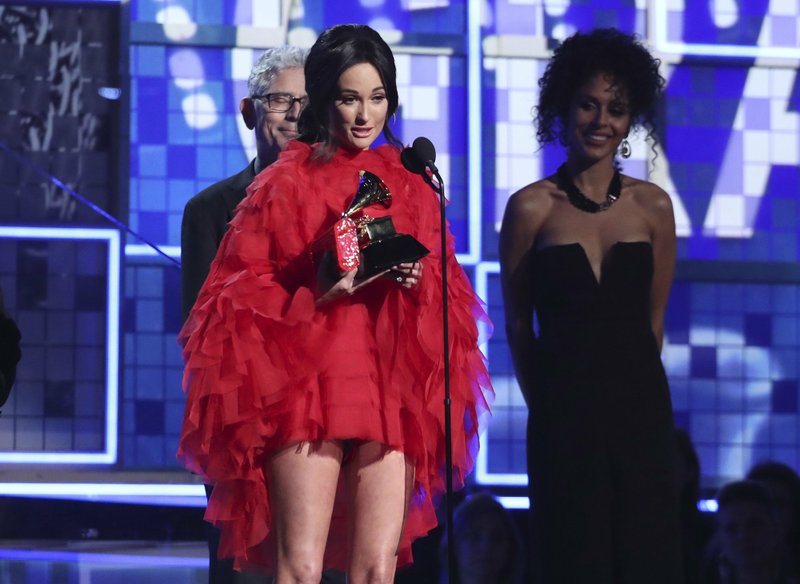You can never really guess what will happen at the Grammy Awards, but when Kacey Musgraves won for best country album a week ago, that seemed fairly predictable. Although she was also nominated for album of the year, the most prestigious trophy, it was logical that voters would award her in the genre-specific category — and then the big prize could go to a superstar such as Drake, or the critically lauded Brandi Carlile, or even the soundtrack to the billion dollar-grossing Black Panther film.
And then, in the closing moments of the nearly four-hour ceremony, host Alicia Keys announced album of the year: "Golden Hour, Kacey Musgraves!" Musgraves — who won over Drake, Carlile, the Kendrick Lamar-curated Black Panther soundtrack, Post Malone, Cardi B, H.E.R. and Janelle Monae — could not have looked more shocked.
"Oh my God. Oh my God! I don't even know what to say," Musgraves said, and immediately got choked up. "It was unbelievable to be even in a category with such gigantic albums, really brilliant works of art. It's really crazy. But I'm very thankful. And I know that winning this doesn't make my album any better than anybody else's in that category, they're all so good."
Musgraves, 30, walked away with four trophies overall, tied with Childish Gambino for the most of any artist: she also won best country song ("Space Cowboy") and country solo performance ("Butterflies.") It's the first time a country artist has won album of the year since Taylor Swift's Fearless in 2010 -- so how did Musgraves break out of the country music bubble to capture enough mainstream attention for the Grammys' biggest award?
Since the Texas-born Musgraves released her first single in 2012, she stood out in Nashville. When so many singers were leaning toward the pop and rock-leaning, party-centric songs that commercial radio programmers craved, Musgraves's first single was pure country: "Merry Go Round," a breathtaking, sharply written track, was a bleak look at feeling suffocated in a small town. It's still her highest-selling song to date, and earned enough acclaim that people outside the genre took notice; she was nominated for best new artist at the Grammys.
In early 2013, Musgraves told USA Today that one thing she heard all the time was, "I don't like country music, but I love you."
A version of that label, the "country singer for people who don't like country music," has stuck with Musgraves for years. Her debut major label album, the Grammy-winning Same Trailer, Different Park, was also a hit, and her third single, "Follow Your Arrow," became an instant classic among her steadily-growing fan base. The references to marijuana use and same-sex kissing were highly unusual for a country artist; Musgraves was also a vocal supporter of LGBT rights, which only brought her more attention outside Nashville.
However, "Follow Your Arrow" proved too controversial for country radio — and although Musgraves seemed a bit frustrated by the radio snub, she appeared uninterested in playing the typical industry games. That included speaking out against country radio, which is normally taboo for Nashville artists, as airplay can often make or break stars.
"I just hate that people are scared of it," Musgraves told the Guardian about "Follow Your Arrow." "But I don't want to be begging. I don't want to be at the mercy of country radio with it. It's gonna have its own life regardless, so I don't really want to ask their permission."
All of Musgraves's singles since "Merry Go Round" have received little attention, including from her second Grammy-nominated 2015 album, Pageant Material. Yet it didn't really matter. She sold tons of albums and concert tickets. The singer, as many country artists have done before her, also recorded a Christmas album -- her way. A Kacey Christmas, released in 2016, was loaded with '60s nostalgia, no small amount of kitsch and dollops of exotica.
Musgraves took her career to another level in March with the release of Golden Hour. The dreamlike album was a risk, sonically, as Musgraves worked with new producers and mixed everything from pop and disco into country. As it turned out, critics loved it, and Nashville industry types also appreciated her unique sound.
"I just started imagining this land, musically, where it was possible to keep these elements of country music that are really intrinsic to my music, like pedal steel, banjo," she told reporters at the Country Music Association last fall, when she also win album of the year. "But I wanted to explore this new frontier for myself with kind of electronic elements. And it's a big mixture of a bunch of different things."
In another critical mainstream boost, Musgraves' music caught the attention of Harry Styles, formerly of One Direction. She opened for him in arenas across the United States last year, and discovered a new set of fans. It all led to this big night at the Grammys, when she won the music industry's biggest prize and put a spotlight on Nashville.
"I love country music with everything that I am," she told the Grammy Awards audience. "And I'm very proud to be able to get to share my version of that with the world."
Style on 02/17/2019

